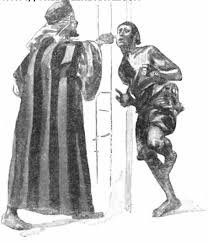Concerning the Treatment of Slaves by Hebrews
The first portion of this week’s Torah Reading deals with the issue of Hebrews owning slaves; particularly Hebrew slaves (Exo. 21:1-11) .
According to this passage, if a Hebrew acquires a Hebrew slave, they would serve that master for 6-years. In the 7th-year that slave would be freed. This is confirmed in Deuteronomy 15:12 which reads,
“And if thy brother, an Hebrew man, or a Hebrew woman, be sold unto thee, and serve thee six years; then in the seventh year thou shalt let him go free from thee” (KJV).
It would seem this ordinance involving the releasing of the Hebrew slave in the 7th month is not directly tied to the Shemitah.
It should be noted that the Hebrews failed to keep this ordinance according to Jeremiah 34:14.
Debt and Slavery
What would justify a Hebrew acquiring a Hebrew slave? The most likely reason is found in Matthew 18:25:
“But forasmuch as he had not to pay, his master commanded him to be sold, and his wife and children and all that he had and payment to be made” (KJV).
In this context, a Hebrew would acquire another Hebrew through unpaid debt.
Ancient Near Eastern custom facilitated that an individual who is in debt to another, be sold into slavery if that debtor is unable to pay off their debt. Torah, although not sanctioning or advocating the practice, established provisions for an individual who is in debt to another to be sold into slavery if the debtor is unable to pay his debt to the master.
Abba, in establishing ordinance regulating the treatment of Hebrew slaves, acknowledged the practice existed. However, Abba established time limits to the servitude. No Hebrew who was enslaved by another Hebrew could be forced into servitude for more than 6-years. That slave was to be released in the 7th year of their enslavement.
Yeshua Clarifies the Practice of Debt Slavery
Yeshua came to clarify Torah for us. In so doing, it was through parable that He taught that the debt owner always had the wherewithal and right to release or forgive his debtor’s debt (Matthew 18).
What Master’s parable teaches the Torah Observant Disciple of Yahoshua is that debt should ultimately be forgiven. No one who is indebted to us, as disciples, should be made to endure unending servitude or strung out debt to us. And this attitude should run across the board and be recognized by every disciple of Messiah.
More Than Material Debt and Slavery
Debt in this sense also transcends the material. Forgiveness is always a virtue that Father has shown to His beloved. The biggest and most pervasive debt we all owe is our sin debt. We are indebted to Father as a result of our sins. Yet Abba has provided a means whereby our debt can be forgiven. We in turn serve and obey Him for his forgiveness of our sin debt.
Likewise, we are compelled to forgive our fellow disciples any physical debts they owe us, as well as any trespasses committed against us by fellow believers.
Master instructed that we lend, hoping for nothing in return…(Luk. 6:35; NKJV).
If we harden our hearts towards those who owe us materially and on a relationship basis, then we stand the risk of not being forgiven by our Heavenly Father. In this regard, Yeshua in the Parable of the Unforgiving Servant stated:
“Then his lord (speaking of the master to the servant who refused to forgive his debtor), after that he had called him, said unto him, O thou wicked servant. I forgave thee all that debt, because thou desiredst me. Shouldest not thou also have had compassion on thy fellowservant, even as I had pity on thee? And his lord was wroth, and delivered him to the tormentors, till he should pay all that was due unto him. So likewise shall my heavenly Father do also unto you. If ye from your hearts forgive not every one his brother their trespasses” (Mat. 18:32-25; KJV).
The Making of a Bond Servant
Nevertheless, back to our Torah Reading passages: Father placed a provision in Torah whereby the servant who chooses to remain in permanent servitude to their master may willingly do so. Thus, the servant desiring bond servant status would be brought to the judgment-seat of God (according to the LXX) or to the judges (according to the KJV and other Authorized Versions) by that master. The purpose appears to be one of making the permanent servitude a publicly stated matter.

A Hebrew slave desiring to serve their master in perpetuity would undergo an ear piercing by an awl on that master’s doorpost.
Upon the conclusion of the proceeding at the judgment seat of God, the servant would then be brought to the door or door post of the master’s home. That servant’s ear would then be pierced by an awl (ie., a metal pointed tool used to punch holes in material like leather).
Thus, that servant would serve that master till the death of the master or of that of the servant (cf. Deu. 15:17).
A Shadow of Good Things to Come
This ordinance is clearly illustrated in our claiming perpetual servitude to YHVH our Elohim. Fortunate for us, Yahoshua Messiah was already pierced on our behalf having himself been judged on our behalf for our sins.
Putting on God’s Image-The Belt of Truth-Part 1 of the Armor of God Series
Ephesians 6:11-18—The Armor of Yah Famous passage of Scripture that most evangelical and fundamental Christians know and understand from a denominational standpoint. In fact, whole ministries have been launched and based upon this passage alone. And the focus seems...
Living the Life of a Priest of God–Yeshua-focused Torah Discussion–Torah Reading 91
Living the Life of a Priest of God (of Yah)--Torah Reading 91 Leviticus 21 Ezekiel 44:25-31 Luke 11:30-44 ________________________________________________________ Leviticus 21--Section Verse Study--Laws Concerning the Levitical Priests Know that you are special in...
Is Torah-Keeping Necessary For Salvation?
This week’s Torah Reading is about the Holiness Codes that Father provided to the Hebrews in order that they be set-apart from the nations of the world. These holiness codes remain in effect for every disciple of Yeshua and are of salvific expediency.
Obedience Versus Faith–Paul and the Book of Romans Series
Link to My Post Entitled: Messianic Duty During Times of Global Crises. This is Obedience Versus Faith--Part 18 of Our Paul and Hebrew Roots Series In preparing to discuss our next challenging Romans’ passage—1:16—I happened upon 1:5: an equally challenging passage...
Torah’s Forbidden Sexual Relationships-Yeshua-Focused Torah Studies–Torah Reading 89–Leviticus 18
This is Torah's Forbidden Sexual Relationships--Yeshua-Focused Torah Studies-Torah Reading -89--Leviticus 18 The underlying theme of our Torah Reading this Shabbat is Sanctification: Being Sanctified unto YHVH. Sanctification is that internal, spiritual...
Animal-Blood-Sacrifices–Torah Reading 88–Leviticus 17:1-16
Animal-Blood-Sacrifices Leviticus 17:1-16 Unpack this Torah Reading Verses 3-4 Prohibition against the slaughter of domesticated animals outside the Tabernacle System. The English term "kill" in Hebrew is SHACHAT {Shaw-Khat} which is rendered slaughter in...
The Book of Romans and the Gospel of God-Part 17 of the Paul and Hebrew Roots Series
Goal: This is “The Book of Romans and the Gospel of God—Part 17 of our Paul and Hebrew Roots Series.” Today we will begin our extensive study of the many challenging Book to the Romans passages by examining one of Shaul/Paul’s foundational doctrines....
The Day of Atonement-Yom Kippur-Torah Reading for 6-6-2020
Parashah 87--Leviticus 16:1-34--Day of Atonement-Yom Kippur-Torah Reading for 6-6-2020 Father Affirms and Enforces His Holiness (vss. 1 & 2) The transgression of Nadab and Abihu (Leviticus 10) led to Abba re-affirming that the Holy of Holies was not a place...

The Messianic Duty in Times of Global Crises
Given all the chaos and turmoil that is ongoing in the world today, I was led to talk to you today about duty. Specifically the Messianic duty in the midst of global chaos. Are we as Messianics required to put our two-cents towards fixing the clobal crises that are...

The Shavuot-Pentecost Connection
Two-Competing Schools of Thought Regarding Shavuot and Pentecost When we talk about Shavuot and or Pentecost there are essentially two-prevailing schools of thought and understanding. Interestingly, these two schools or lines of thought are often at odds with one...

0 Comments